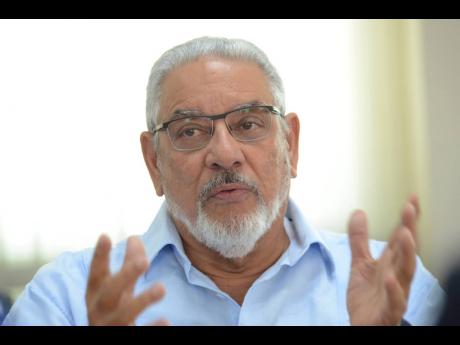Elizabeth Morgan | James Moss-Solomon: A regional man
ON JANUARY 4, Jamaica and the region lost James ‘Jimmy’ Moss-Solomon, a strong advocate for the engagement and strengthening of the regional private sector in the work of the Caribbean Community (CARICOM) and especially in the building of the CARICOM Single Market and Economy (CSME).
He was interested in promoting intra- and extra-regional trade in goods and services. I would say that he stepped up to the wicket and endeavoured to play a solid innings. He was not afraid to admit that foreign trade policy was not his area of expertise, but recognised its importance, and demonstrated a willingness to learn. He brought his practical experience in business to the table.
Moss-Solomon (1951-2022) was the son of James Seivwright Moss-Solomon (1895-1977), a joint founding manager of Grace Kennedy and Company established on February 14, 1922. He attended Jamaica College and McMasters University in Canada, joining Grace Kennedy in 1971 where he remained for 35 years. Outside of sugar and rum, GraceKennedy is one of the oldest and largest locally owned companies in Jamaica and the region, expanding from goods only into services and developing its brand. The company operates in Jamaica, the CARICOM region, USA, Canada, United Kingdom (UK), European Union (EU), and even venturing into Africa. GraceKennedy will mark its 100th anniversary this year.
Moss-Solomon recognised that for a company like GraceKennedy, it was necessary to be aware of policy developments in regional trade, and also in foreign trade policy generally, as the company was operating in international markets and had to comply with international trade rules and regulations. He also recognised that strong private sector bodies were needed at both the national and regional levels to propel the growth agenda.
He was clearly committed to GraceKennedy, Jamaica and the CARICOM region. Apart from his involvement in private sector organisations in Jamaica, he was engaged in the effort to revitalise the regional private sector, through the then umbrella organisation, the Caribbean Association of Industry and Commerce (CAIC). The CAIC traces its origins to 1955. The association was involved in the founding of the Caribbean Free Trade Association (CARIFTA) in the 1960s and CARICOM in 1973, but was losing its vigour and vitality.
Recognising the benefits of a strong regional umbrella private sector organisation, Moss-Solomon took on the presidency of the CAIC from 2004-2009. After demitting office, he remained a special adviser.
He worked with CARICOM and the ACP Caribbean Forum (CARIFORUM) through Caribbean-Export.
In 2008, while CAIC president, he headed a task force of the CARICOM Agricultural Investment Forum and urged the private sector to step up to the plate and get involved in partnering with government. In 2010, he told CARICOM leaders to act decisively on matters before them. Generally, he encouraged all groups within CARICOM to unite, acting to make progress, or they would just be paying lip service to regional trade and integration, getting nowhere.
He felt that policies should support a growth agenda and Caribbean entrepreneurs should be among inventors and innovators. He encouraged regional branding. In trade negotiations, Moss-Solomon was a voluntary private sector adviser to the Caribbean Regional Negotiating Machinery for the Free Trade Area of the Americas and CARIFORUM/EU Economic Partnership Agreement negotiations.
Through Caribbean-Export, he supported establishing a Caribbean Business Council, which he thought was necessary.
The Caribbean Business Council has not materialised after years in gestation. The CAIC, though still existing, seems weaker and not the strong regional umbrella organisation he had envisaged, given its history.
There are now two new regional private sector bodies, namely, the Network of Caribbean Chambers of Commerce and the CARICOM Private Sector Organisation (CPSO), which seems mainly focused on intra-regional trade. CPSO has been designated an associate institution of CARICOM.
The region needs more people from the private sector like Moss-Solomon, who are willing to be actively engaged in strengthening the regional private sector and in partnering with the governments in promoting production and exports into the regional and external markets to generate economic growth. The region also needs people in the private sector who understand foreign trade policy issues. Building back better must have an actively engaged and knowledgeable private sector.
Interestingly, I read an article in the Sunday Observer (January 16, 2022), in which two members of the Jamaican business community are calling for building an export-oriented economy, focusing on export-led growth, for both goods and services. I can hear someone like Moss-Solomon saying, ‘Dah! This has been on the table for a long time, numerous proposals, including from Stanford Professor Emeritus Donald Harris (1997 Towards Export-led Growth) and UWI Professor Densil Williams – it is time for the national/regional private sectors and governments to act jointly and stop paying lip service.’
Moss-Solomon, walk good. Your efforts are appreciated as the many tributes have shown.
Elizabeth Morgan is a specialist in International Trade Policy and International Politics. Email feedback to columns@gleanerjm.com .

